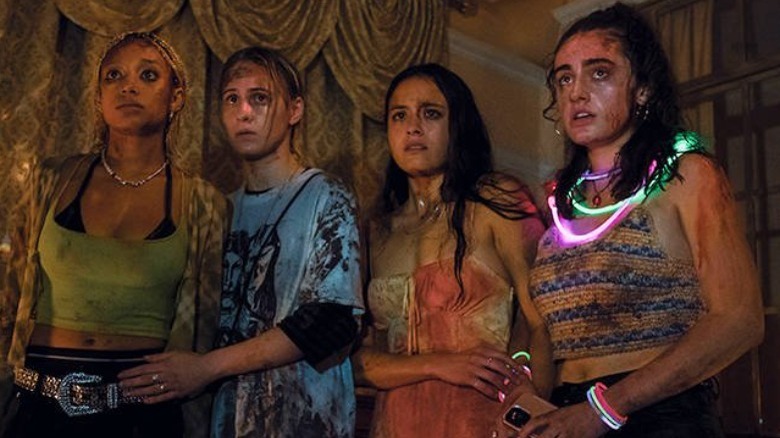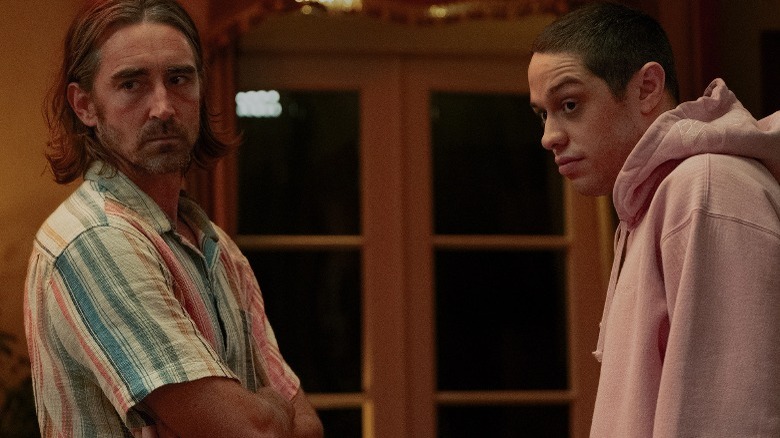Bodies Bodies Bodies Ending Explained: A Smart Horror Satire Ends On A Laugh
Ahead of its release, A24's "Bodies Bodies Bodies" billed itself as a satirical, Zoomer-skewering slasher, crammed with jokes about the pettiness of its irritating cast of characters. That version of the movie would be plenty entertaining in itself, but in practice, it turned out to be something even more interesting than that: an "And Then There Were None"-style story about young adults whose privileges, problems, and hard-wired sense of distrust leads them to a point of total meltdown over the course of a single night.
The most surprising part of the film about six young adults and one fortysomething man trapped in a mansion during a storm might not be who killed who (though we'll talk more on that later), but who the film is actually going after with its cutting humor.
A savvy send-up
Trailers for "Bodies Bodies Bodies" presented it as a horror-comedy fueled by the schadenfreude of seeing shallow, entitled people get killed off on screen. The promos especially highlighted the very "online" language the girls co-opt, using oversaturated terms like "triggered" and "toxic" and "silenced" to darkly comic effect. How stupid are these people that they'd still be arguing over these things while caked in blood mid-massacre, right?
It turns out, the answer is not particularly stupid. Sarah DeLappe's screenplay, which is based on a story by "Cat Person" author Kristen Roupenian, leaves plenty of room for sympathy for these characters and imbues them with a generation-specific savviness despite their weak spots. They may be clueless about some things, and needlessly cruel to one another, but several of them also have an extremely strong self-preservation instinct.
When the power goes out, the group has a pile of flashlights at the ready. When someone dies, they grow suspicious, especially towards the one person in the house who's older than them. The story carries a baseline of mistrust that doesn't seem catty so much as understandable: these are people who have been given money and technology, but not much else. They have clear trouble connecting, bringing new Tinder boyfriends on weekend getaways, making podcasts their friends won't listen to, and lying to one another to try to preserve an idealized version of love.
Who's really being satirized?
In Sophie (Amandla Stenberg) and Bee's (Maria Bakalova) cases, they've also already become collateral damage in a sociopolitical war waged by the generation before them. Sophie is an addict, while Bee secretly has no job. The film doesn't put too fine a point on any of these details, but it reminds me of the blistering monologue at the end of the much more overtly pro-Gen Z satire "Assassination Nation": "don't take your hate out on me, I just got here," the heroine of that movie says to camera after her world collapses into adult-driven chaos.
The same could be said for some of the characters in this movie. Several of them have inherited wealth, sure, but they also inherited a crappy economy, an opioid epidemic, and a helplessly tech-dependent worldview. They didn't ask for any of that, just as they didn't ask to spend their vacation cowering in dark corners worried their friends will kill them.
"Bodies Bodies Bodies" has garnered comparisons to HBO's "Girls," another show that saw the humanity in its characters despite their ample flaws, and I think that's apt. The movie surprises and delights us because characters are often smarter than the "satire" label would have us expect them to be, and are only the butt of the joke when the movie calls for it. A few times, though, "Bodies Bodies Bodies" definitely does call for it.
Unpacking that climactic fight
The film finally dips into broader satire in its last few scenes, beginning with a scene in which Bee, Sophie, Alice (Rachel Sennott), and Jordan (Myha'la Herrold) air out all their grievances while one of them waves a gun around. Its characters start skewing closer to caricatures of self-absorbed, incompetent Zoomers here, regurgitating the overused mental health jargon I mentioned earlier and accusing one another of being controlling, unfaithful, and — in one particularly hilarious line delivery — upper-middle class.
Despite its purposeful silliness, this scene, too, plays into the film's covert themes about youthful disconnect. Rather than empathize with Bee, who emotionally reveals that she dropped out of school to care for her mom, who has Borderline Personality Disorder, the rest of the group gets caught up in arguing about podcasts and personality types. They're too far gone, bickering over all the wrong things instead of saving themselves or helping one another. It's extremely funny, but depressing, too. This scene is essentially Twitter in a nutshell.
In its ironic finale, the movie leans even further into its assertion that these (mostly) clever yet distractable young people are caught up looking at all the wrong things. By the final scene, Bee and Sophie are the only survivors, and instead of teaming up against the killer, they can't help but focus on a decidedly less pressing issue: whether or not Sophie cheated on Bee with Jordan. This is how, in a mad scramble to check Sophie's texts, they end up with David's (Pete Davidson) phone and find out how he truly died.
The killer's ironic unmasking
The great punchline of "Bodies Bodies Bodies" is that there never was a killer, except perhaps misplaced machismo and a need for clout. The night before, Alice's hot, dopey older boyfriend Greg (Lee Pace) effortlessly opened a champagne bottle with a kukri (basically a Nepalese machete). Now, the girls see that David, who was jealous of Greg, tried to do the same thing for a TikTok video just as the storm was bearing down, and accidentally cut his own throat in the process. When the girls found his body and the bloodied kukri, it was only natural that they assumed there was a killer among them.
This revelation isn't just darkly hilarious, but it also asks us to reframe everything we've seen so far. Almost every character had an element of their alibi or backstory that seemed like it could've been a lie, but it turns out, most of them were being honest. Poor Greg, who Bee clobbers with a kettle weight, didn't kill anyone, and truly was just vibin' in the other room while all hell broke loose. Emma (Chase Sui Wonders) isn't a skilled liar, but a just-okay actress, one who fell down the stairs after taking drugs with Sophie. Alice, whose vapid guilelessness meant she was never much of a suspect anyway, was accidentally shot during a struggle over the gun. Jordan ended up pushed over the stairwell, falling into a pile of shattered glass bottles at the height of the final trio's paranoia.
Sophie, Bee, and a cell phone
Then there's Sophie and Bee. It's a testament to the film's characterizations that we get why Bee would keep looking for confirmation of her partner's infidelity when it's pretty clear that she already had it. Earlier in the movie, we see Bee notice Jordan's distinctive-looking bralette in her bedroom. Later, she finds the matching pair of panties in the backseat of Sophie's car. So when Jordan claims she just hooked up with Sophie, there's really no need for Bee to check her girlfriend's texts to confirm it. Yet, she never brings up the underwear.
Halina Reijn's sharp, ever-shifting direction keeps audiences from getting totally inside any one character's head, but if it does align us visually with anyone, it's Bee. At first, her introversion seems to hint at a dark secret. But later, when her backstory is revealed, it's clear that Bee wants desperately to be loved and feel secure, even if that means purposely ignoring a whole heap of red flags about her partner.
The movie's endnote, then, is an especially wry one. A character we'd heard about but never seen, Max (Conner O'Malley), returns to the house the next morning, only to find a bloodbath. When he asks the girls what happened, Bee is distracted by her phone, and the last shot freeze-frames on her innocently pleased face as she tells Max and Sophie that she has cell service again. It's one last dig at phone-obsessed young people, but the movie as a whole is clever enough that it's also a culmination of every funny-tragic-dark thing that came before.
Bee's life is in shambles, but she has one small, comforting signifier of a return to order – the persistent chirp of her phone notifications — to deliver that inevitable boost of manufactured serotonin nonetheless.





